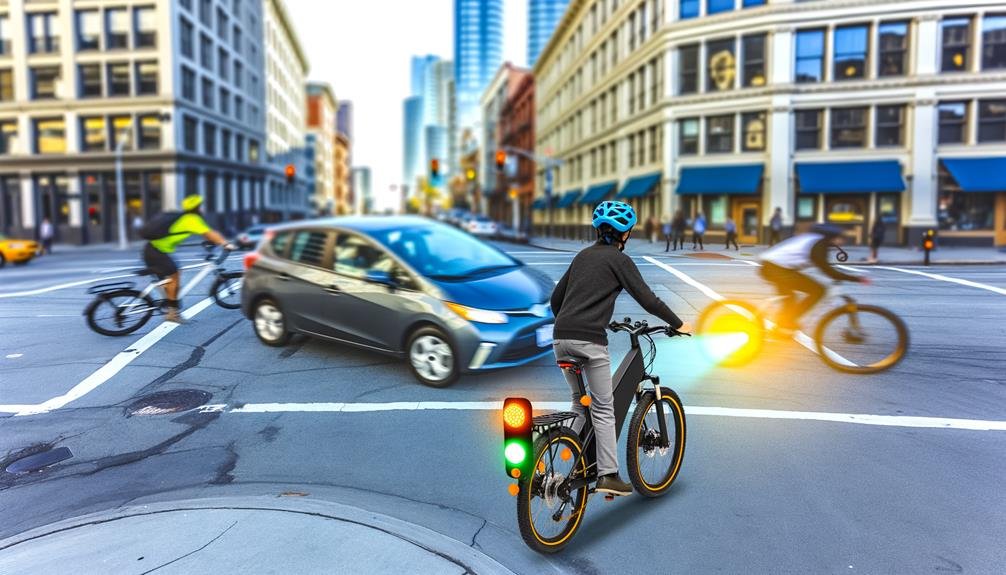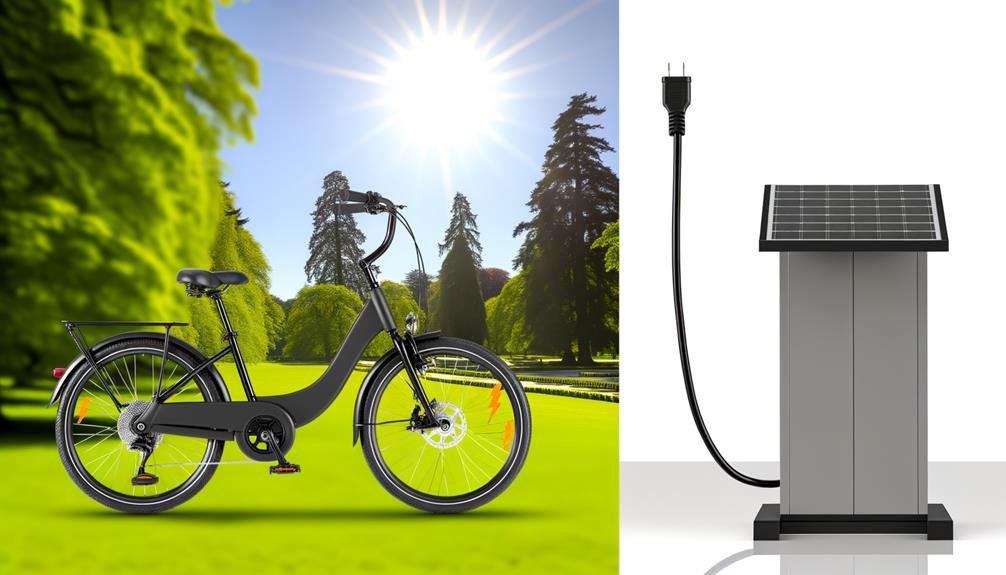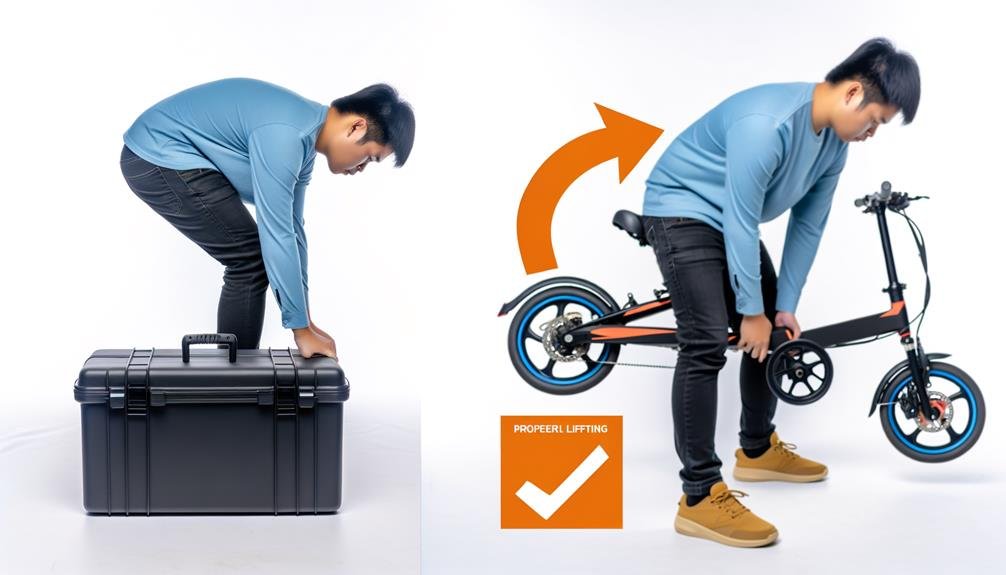Charles Miller is a veteran bike enthusiast with over 12 years of experience dealing with bikes as a mechanic. Despite immense love and expertise for...
In a world where walking seems to be an outdated concept, one might wonder about the legality of using electric bikes on the road. As an avid cyclist and researcher, I've found that the rules and regulations regarding e-bikes are as diverse as the models on the market.
While some places warmly embrace these power-assisted two-wheelers, others still grapple with their place in the transportation spectrum. But, before you start imagining yourself gliding effortlessly up hills or zipping through traffic on your shiny new e-bike, wouldn't you want to know more about this fascinating and somewhat complex issue?
- Key Takeaways
- Understanding Electric Bike Legality
- Safety Measures for Road Use
- Benefits of Electric Bikes
- Cost and Environmental Impact
- Exercise Opportunities With E-Bikes
- Convenience of Electric Bikes
- Fun Aspects of E-Biking
- Choosing the Right E-Bike
- Navigating E-Bike Accidents
- Frequently Asked Questions
- Conclusion
Key Takeaways
- Electric bike legality varies from state to state, so it is important to consult local government or state websites for specific regulations.
- Safety measures for road use include wearing a helmet, observing the speed limit, wearing reflective clothing, and signaling when turning or slowing down.
- Electric bikes have several benefits, including reduced emissions, energy efficiency, cost efficiency, and improved cardiovascular health.
- E-bikes provide a gentle exercise option, enhance overall fitness, and offer an enjoyable workout while riding.
Understanding Electric Bike Legality
Navigating the legality of electric bikes can be a bit of a maze, as regulations vary widely from state to state, with specific rules covering motor power, maximum speed, pedals, brakes, and even the minimum age of riders. As a responsible e-bike user and member of our biking community, it's essential to understand how electric bikes are classified and regulated in your local area.
The laws concerning the use of an electric bicycle on a public road aren't uniform across the country. In some states, helmets are mandatory, while in others, they're merely recommended. It's crucial to consult your local government or state website to understand your local e-bike laws.
Beyond this, there are also regulations regarding where you can ride. Some places may prohibit electric bikes on sidewalks or bike lanes, so it's crucial to know where you're allowed to go. Remember, safety is paramount, so always obey traffic signals and signs, and wear reflective clothing at night.
Understanding how your state classifies and regulates electric bikes is key. This knowledge not only helps you enjoy your bike to the fullest but also fosters a sense of belonging and responsibility within our e-bike community.
Safety Measures for Road Use
Now that we've sorted out local laws and regulations, let's focus on how to stay safe while riding your electric bike on the road.
It's essential to adhere to safety measures for road use when you ride an electric bike.
Firstly, you must wear a helmet. This isn't just to comply with bike laws; it's for your safety. No matter how skillful you are, accidents can happen, and a helmet can be a lifesaver.
Remember, electric bicycles have a speed limit. Just because your e-bike can go fast doesn't mean you should push it to its limits, especially on public roads. Observe the speed limit and respect other road users.
Reflective clothing is a good idea, especially at night. It makes you more visible to other road users. Good signaling when turning or slowing down is also crucial.
Lastly, understand the rules of the road. Electric bicycles are meant for the public road, not sidewalks or pedestrian areas. Abiding by these rules isn't just about avoiding fines; it's about ensuring we all have a safe and enjoyable ride.
Benefits of Electric Bikes

I'm excited to talk about the benefits of electric bikes.
Not only are they a cost-effective and eco-friendly mode of transport, but they also offer great health benefits.
We'll look at these perks and more in this section.
Eco-Friendly Transportation Alternative
In terms of eco-friendly alternatives, electric bikes stand out due to their numerous benefits. If you're contemplating whether to use an e-bike as your mode of transportation, here are some points that might convince you.
| Benefits of E-Bike | Description |
|---|---|
| Reduced Emissions | Ride an electric bike instead of a car to significantly cut down on greenhouse gas emissions. |
| Energy Efficiency | E-bikes use less energy per mile compared to cars and even public transit. |
| Cost Efficiency | The cost of charging an e-bike is much lower than fueling a car. |
| Health Benefits | Riding an e-bike promotes physical activity and improves cardiovascular health. |
| Accessibility | Electric bikes are easy to use and can be ridden on most public roads. |
Join the e-bike revolution and become part of the eco-friendly transportation alternative. It's a win-win for you and the environment!
Health and Fitness Perks
While e-bikes certainly offer an eco-friendly transportation alternative, they're also a fantastic way to improve your health and fitness. The benefits of riding an electric bike are numerous. As an e-bike rider, you're not just engaging in recreational activities, but also reaping health and fitness perks.
When you ride an ebike, even electric mountain bikes, you're gently exercising while the electric motorized system assists you, providing that peak power when needed. This makes it an enjoyable workout, enhancing your overall fitness without the strain associated with traditional bikes.
It's not just about the destination, but the journey as well. So, why not join the community of e-bike riders, enjoy the ride, and improve your health all at the same time?
Cost and Environmental Impact
Electric bikes aren't just pocket-friendly due to their lower initial investment and recharge costs, they're also a green alternative, significantly reducing our carbon footprint. When we consider the cost and environmental impact, Class 1 ebikes come up trumps. These bikes, by definition of an electric bike, use a motor that assists only when we're pedaling, making them energy efficient.
The classes of electric bikes are determined by the power of the motor and its impact on the environment is minimal. This makes it a smart choice for those of us who aim to make a positive environmental difference. On top of that, the laws regarding ebike road use are generally more favorable, with most local government or local authority encouraging the use of these eco-friendly bikes.
Our collective shift towards more sustainable means of transportation is crucial to combat climate change. Opting for electric bikes isn't only a savvy move for our wallets, but it's also a significant step in the right direction for our environment. They're a practical, cost-effective, and eco-friendly solution for day-to-day commuting.
Exercise Opportunities With E-Bikes

Beyond being eco-friendly, e-bikes also offer a unique way to squeeze some exercise into your daily routine. They're not just a means of transportation, but a gateway to physical fitness and health. With e-bikes, you don't have to be a seasoned athlete to get moving. Their pedal-assist technology, adjustable motor assistance, and varying speed options make them the perfect tool for everyone.
You can choose to pedal more, reducing motor assistance, and engage in a more rigorous workout. This must be music to the ears of fitness enthusiasts. Imagine burning up to 92 calories per mile at a moderate pace!
The Class of e-bikes you choose also matters. Riding a Class 3 e-bike, for instance, with its higher speed limit, can offer a more intense workout. This is perfect for the adrenaline junkies among us.
Lastly, with e-bikes, you're allowed to ride anywhere a regular bicycle is allowed, expanding your exercise opportunities with e-bikes. For those yearning for community and connection, group rides can become a cherished part of your routine.
Convenience of Electric Bikes
In addition to providing unique exercise opportunities, e-bikes also boast an impressive level of convenience that's hard to beat. Whether you're wearing your work clothes or your weekend casuals, e-bikes help you reach your destination without breaking a sweat. With a top speed of 25 miles per hour, they're fast enough for most urban and suburban journeys, yet you don't need a special license to ride them.
Riders must keep in mind that the maximum speed allowed on public roads depends on local regulations. Even so, the electric motor's assistance helps propel the bike, reducing the physical effort required, especially on uphill terrains.
Unlike cars, e-bikes can be used on bike lanes, adding to the convenience of electric bikes. You can whizz past traffic, carving your path through the city with ease. What's more, the convenience doesn't end once you reach your destination. E-bikes are easy to park and store, and they don't require the constant maintenance that cars do.
In short, the convenience of electric bikes extends far beyond the ride itself. It's a lifestyle choice that's both practical and enjoyable.
Fun Aspects of E-Biking

One can't deny the sheer joy and thrill that comes with riding an e-bike, making it not just a mode of transportation, but a fun and exciting activity in itself. The fun aspects of e-biking are plentiful, promising an adrenaline-filled ride that transcends age, and injects an element of thrill into my everyday commute.
Considering buying an electric bike? Here are a few things you should know:
- Age: The minimum age to legally ride an e-bike is usually determined by the local laws. In most places, you must be at least 16 years of age.
- Speed: Depending on how it's classified, as Class 1, 2, or 3, an e-bike can go up to 28 miles per hour – a speed that certainly adds to the excitement.
- Designated Bike Lanes: E-bikes are allowed on most designated bike lanes, opening up a world of exploration and adventure in your own city.
Choosing the Right E-Bike
After savoring the thrill of e-biking, let's explore how to choose the right e-bike that fits your needs and satisfies local regulations. It's like joining a club where we all share a common passion.
Firstly, it's crucial to get to grips with the laws at the state level. In some places, you might need a license if you're less than certain years old. Some states also limit the use of class 3 electric bikes on bicycle paths, so do your research.
Next, you'll want to consider what you'll be using the bike for. If you're planning on commuting, you might need a bike with more motors power. If you're looking for leisurely rides, perhaps max speed isn't as important.
When choosing the right e-bike, don't forget to evaluate its security features. You'll want to feel safe when you're out and about.
Lastly, it's all about your comfort and convenience. The right e-bike should fit your body type and riding style. It's not a one-size-fits-all scenario. But once you find your perfect match, you'll feel like you truly belong in the e-biking world.
Navigating E-Bike Accidents

Navigating the aftermath of an e-bike accident can be a tricky path, so it's crucial to know the key steps to take. It's essential to remember that e-bikes are more than just bicycles – they're a type of motorized vehicle. Just like with cars, it's legal to ride them on the road, but there are laws and regulations that riders need to follow.
Firstly, you'll need to understand the different regulations that apply to e-bikes:
- Some states require that e-bikes must be registered, just like any other motorized vehicle.
- You may need to register your e-bike before riding it on public roads.
- A few states require riders to have a license to ride an e-bike.
- Check the laws in your state to see if you need one.
- Local laws can also vary greatly.
- It's crucial to familiarize yourself with local laws to avoid penalties.
In case of an accident, your knowledge of these regulations can greatly impact the outcome. Following the laws not only ensures a sense of belonging among other road users but also fosters a safer environment for all.
Frequently Asked Questions
Are Electric Bikes Street Legal in the Us?
Yes, electric bikes are generally street legal in the US. However, laws vary by state, so I'd advise checking your local regulations. They're a fun, eco-friendly way to get around, and I'm a big fan!
Do You Need a License for an Ebike in Texas?
No, you don't need a license for an eBike in Texas. Regardless of Class 1, Class 2, or Class 3, Texas doesn't require licensing or registration for electric bikes. Just ride responsibly and enjoy!
Do Texas State Parks Allow Ebikes?
Yes, I can use my ebike in Texas state parks. It's a fantastic experience, really makes me feel connected to nature. But remember, Class 2 and 3 ebikes need local authority permission for trail use.
How Do You Ride an Electric Bike on the Road?
Sure, I ride my electric bike on the road all the time. It's just like a regular bike, but I obey traffic laws and signal my turns. Plus, I always wear a helmet for safety.
Conclusion
So, can you take your e-bike on the road? Absolutely, with the right precautions and rules in mind, it's a green light.
E-bikes aren't just a breeze to ride, they're a breath of fresh air, offering health benefits, convenience, and a touch of thrill.
But remember, each ride should be a safe one. After all, it's not just about going places, but enjoying the journey and arriving safely.

Charles Miller is a veteran bike enthusiast with over 12 years of experience dealing with bikes as a mechanic. Despite immense love and expertise for his Tacoma, he rides his Trek Ebike more. Anytime you meet him, you’ll either hear him talking about Bikes, or writing about all things bikes and cars on this blog.
More Posts


